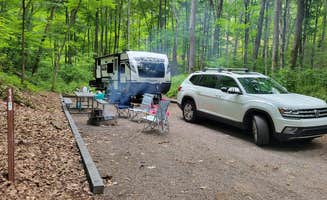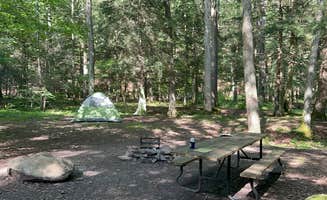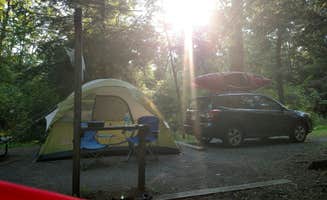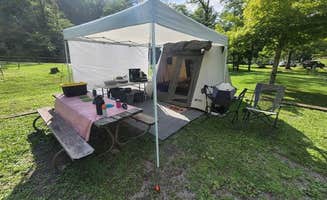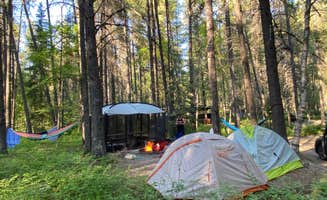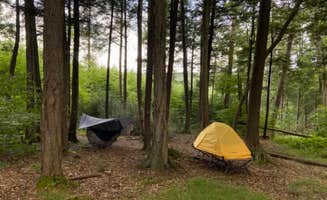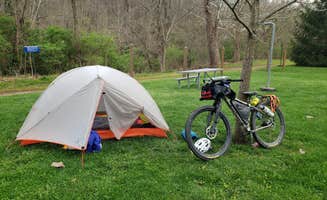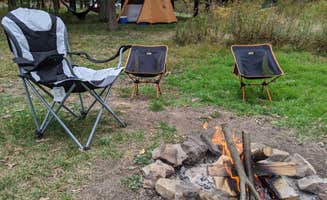The camping spots near Accident, Maryland sit at elevations ranging from 2,300 to 2,800 feet in the Allegheny Mountains, creating cooler summer temperatures that typically stay 5-10 degrees below surrounding lowland areas. The region's microclimate means campers often need warmer sleeping gear even in summer months, as nighttime temperatures can drop into the 50s during July and August.
What to do
Creek exploration: Swallow Falls State Park offers access to multiple waterways including the Youghiogheny River. "The trails to the namesake falls are beautiful and very family-friendly, with lots of helpful signage. However, the parking lots and trailheads were PACKED on the weekend, so if you're a day tripper, get there early!" according to reviewer Jen V. The park contains Maryland's tallest waterfall at 53 feet.
Mountain biking: Ohiopyle State Park connects directly to extensive trail networks. One camper noted, "Awesome campground right on the Great Allegheny Passage trail. We loved being able to access the GAP trail right from the campground." The park serves as a hub for cyclists with trails suitable for various skill levels.
Fishing opportunities: Several campgrounds provide direct water access. At Big Run State Park, "The stream was incredible and lively with trout and crayfish," reports camper Nathan S. The area's streams support both fly fishing and traditional angling with multiple public access points.
What campers like
Natural swimming areas: Many campers appreciate cooling off in the region's waters. At New Germany State Park, "The small lake was perfect for swimming, and the hikes around the campground were beautiful." The beach areas typically have gradual entries without lifeguards.
Wildlife viewing: Forested sites offer excellent animal observation opportunities. At Savage River State Forest, "We spotted a raccoon, a bunny, a chipmunk, and (along the nearby roads) lots of deer—don't drive too fast!" The area supports abundant wildlife including beavers, foxes, and over 100 bird species.
Firefly displays: Summer campers frequently mention the light shows. As one camper at Deep Creek Lake State Park described: "We were lucky enough to witness a spectacular light show put up by thousands of fireflies at night." Peak firefly season runs from mid-June through early July, particularly in less-developed camping areas.
What you should know
Campsite spacing varies dramatically: While some campgrounds offer secluded sites, others place campers closer together. At Tub Run Recreation Area, "Creekside sites felt smaller and more crowded than lakeside sites, which open onto the beach and lake." Research specific site dimensions when reserving.
Limited cell service: Most campgrounds in the region have minimal connectivity. At Coopers Rock State Forest, "The camp Wi-Fi isn't the best but we did have cell service with Consumer Cellular (AT&T Towers) and were able to work while we camped." Only developed areas near towns provide reliable connectivity.
Seasonal bathhouse operations: Not all facilities remain open year-round. A camper at New Germany noted, "There is one bathroom that offers warm showers. If you're camping at sites 14-26, the walk may seem a bit long to use the john." Many primitive campgrounds have pit toilets only with no shower facilities.
Tips for camping with families
Interactive nature programs: Several parks run scheduled activities. "For kids they have a small jungle gym and critter center," notes one visitor to New Germany State Park. Programs typically run on weekends between Memorial Day and Labor Day.
Playground options: When children need breaks from hiking, dedicated play areas help. At Savage River State Forest, "There are some shallow swimming holes that are nice when it's hot." Most developed campgrounds include basic playground structures.
Safety considerations: Wildlife awareness is important for families. "Bears are common so they emplaced a big old bear box at every site. It's enough room to hold your food for a month of camping!" shares a camper from Deep Creek Lake. Bear activity increases from June through September.
Tips from RVers
Access challenges: Many forest roads present difficulties. At Outflow Camping Area, "The tent site I was in was also nicely designed, with a tent 'pad', as well as full campfire ring, picnic table, and lantern hanging hook. There are tent, RV, and group sites at this campground." Most RV sites accommodate units under 30 feet in length.
Hookup availability: Electric connections exist at several campgrounds but vary in quality. A Tub Run camper noted, "Roads are easy to navigate and equipment all works well. Staff are very friendly and helpful." Water connections are less common than electric hookups throughout the region.
Dump station locations: Plan ahead for waste disposal. At Deep Creek Lake, "We were told there were regular bear sightings and there were bear boxes at each site; we saw many deer but not a single bear." Many campgrounds without onsite dump stations direct RVers to nearby facilities within a 15-20 minute drive.



